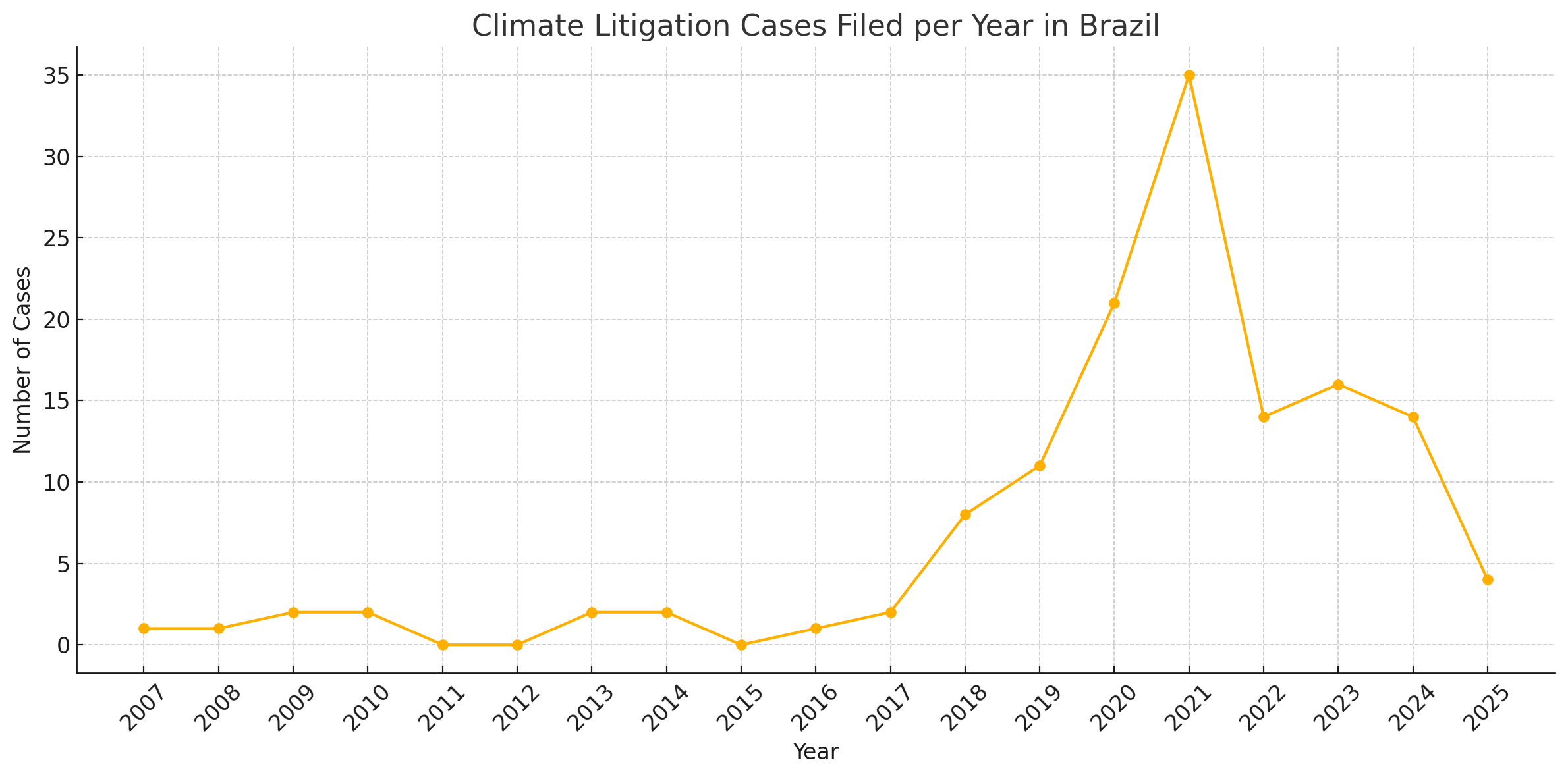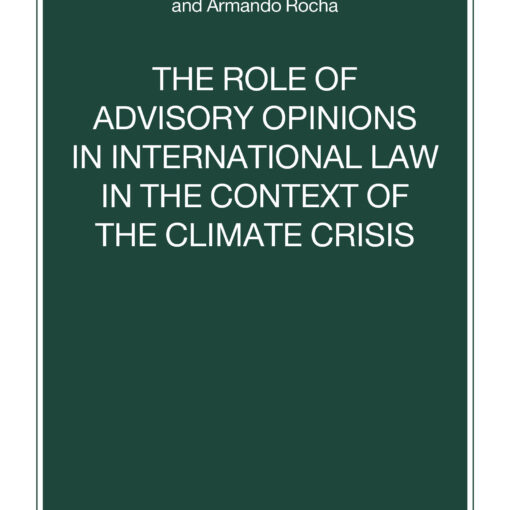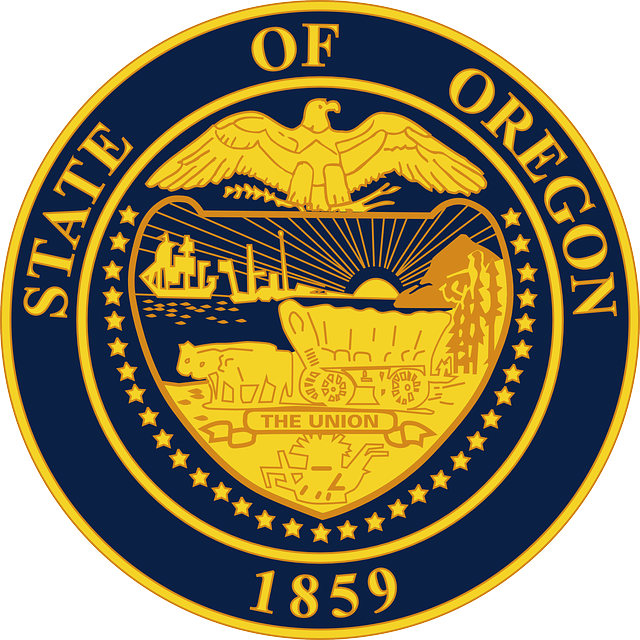As of June 2025, Brazil had the third largest number of climate litigation cases of any country in the world. To date, a total of 135 climate cases have been brought in Brazil—surpassing other major jurisdictions and trailing only the United States and Australia. Remarkably, the vast majority of these cases have been filed since 2020, as shown in the chart below, reflecting the accelerating pace and momentum of climate litigation at the national level. This exponential growth, combined with the legal innovation and global relevance of these cases, underscores Brazil’s pivotal role in shaping the field of climate litigation worldwide.
Brazil and Climate Justice: Pioneering Climate Litigation for a Global Cause, co-edited by Maria Antonia Tigre, Armando Rocha, and Délton Winter de Carvalho, is the first comprehensive book dedicated to Brazilian climate litigation for an international audience. The book is the result of over two years of research and includes contributions from 28 Brazilian scholars, each providing expert insights into the legal, institutional, and social dynamics of Brazil’s climate litigation landscape. Written in English and tailored for global readers, the book serves as both an introduction and a deep dive into the fastest-growing climate litigation jurisdiction on the planet. The book was published by De Gryuter Brill as part of its International Environmental Law series.
The book draws together diverse voices and legal perspectives to offer a deep and nuanced portrait of climate litigation in one of the most biodiverse and ecologically significant countries on Earth. With analysis ranging from efforts to protect the Amazon to lawsuits targeting financial institutions and pushing for a just transition, Brazil and Climate Justice provides both a snapshot and a roadmap for understanding how litigation is reshaping climate policy in the Global South and beyond.
We are especially honored to include a powerful foreword by Michael Gerrard, who described the book as a “timely” volume with “invaluable insights into one of the most active and consequential areas of climate litigation.” Further, he notes how several cases respond to a “troubling trend of deregulation and weakening of environmental and climate laws,” showing “the crucial role that courts play in safeguarding the environment, compelling governmental accountability, and ensuring compliance with both domestic climate legislation and international climate commitments.”
The book is organized into five sections:
- The first section, Challenges in Climate Litigation in Brazil, sets the scene by exploring institutional frameworks, the role of science, and the separation of powers in climate litigation.
- The second, Climate Litigation and Human Rights, analyzes how Brazilian courts are interpreting the Paris Agreement and constitutional rights to support stronger climate action, including through international advisory opinions and expanded access to justice.
- The third, Climate Litigation and Vulnerabilities, centers the experiences and strategies of the communities most affected by the climate crisis—women, racialized groups, Indigenous peoples, and future generations.
- The fourth, Climate Litigation and Biodiversity, turns to the Amazon, the marine environment, and the emerging “rights of nature” movement, offering a legal lens on ecosystem protection.
- The fifth and final section, Beyond the State: Climate Litigation and the Energy Transition, examines the role of financial institutions, tort law, and ambition in Brazil’s transition landscape.
The relationships mapped across these chapters are complex and sometimes fragmented, but they reveal a vibrant, evolving legal field where new strategies, jurisprudence, and actor coalitions are taking shape. Each chapter offers not only theoretical and doctrinal insights, but also critical context for understanding the role of law in confronting the overlapping challenges of climate change, inequality, and governance in Brazil and across the Global South.
As Brazil reemerges as a global leader in climate diplomacy and hosts COP30, this book documents how litigation, largely driven from within, is already transforming legal norms and expectations.
Special thanks to the team at Brill, to the Sabin Center for Climate Change Law, and to all the partners who have supported this research, especially the Brazilian Climate Litigation Platform (JUMA) and the Columbia Global Center in Rio de Janeiro.
The book is now available in print and digital formats through Brill and Amazon.
With critical acclaim from global experts:
“In terms of climate litigation, Brazil is not only the leading country in the Global South, but one of the leading countries in the world.”
— Dan Farber, UC Berkeley
“Written by a dream team of Brazilian practitioners and scholars… this book is an essential resource for anyone interested in understanding how legal systems in the Global South are responding to the urgent challenge of climate change.”
— Joana Setzer, LSE
“This book delves into the Brazilian experience, exploring the potential benefits of judicial action while critically examining the separation of powers and the rights of the most vulnerable.”
— Mariana Cirne, Chief Prosecutor, Brazilian National Attorney’s Office for Climate and Environmental Defense
We are grateful to all of our contributors for sharing their expertise, insight, and knowledge of Brazilian climate law. This volume would not have been possible without the collective work of: Danielle de Andrade Moreira, Enéas Xavier de Oliveira Junior, Letícia Simo Veras, Juliana de Augustinis, Carolina de Figueiredo Garrido, Paula Wojcikiewicz Almeida, Luciana Gross Cunha, Maria Cecília de Araujo Asperti, Mariana Belmont, Nauê Bernardo Pinheiro de Azevedo, Gabriel Mantelli, Maurício Terena, Isabela Bicalho, Marie-Louise Siemons, Luciana Bauer, Julia Cirne Lima Weston, Anna Maria Cárcamo, Fernanda Cavedon-Capdeville, José Rubens Morato Leite, Humberto Filpi, Tônia Dutra, Alessandra Lehmen, Guilherme J. S. Leal, Rafaela Martins da Rosa, Luiz Ormay Jr, and our co-editor contributors Maria Antonia Tigre, Armando Rocha, and Délton Winter de Carvalho.
We hope it proves useful to researchers, practitioners, advocates, and students around the world.
Dr. Maria Antonia Tigre is the Director of Global Climate Litigation at the Sabin Center for Climate Change Law at Columbia Law School.







